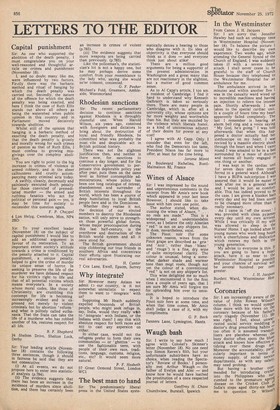Capital punishment
Sir: As one who supported the abolition of the death penalty, I must congratulate you on your well-reasoned and thoughtful article on crimes and punishment (November 18). I, and no doubt many like me, were influenced by two factors. Firstly there was the barbaric method and ritual of hanging by which the death penalty was carried out. Secondly, the nature of the offence for which the death penalty was being exacted, and here I think the case of Ruth Ellis stands out above all others as being the watershed when public opinion in this country and in
Parliament moved decisively towards abolition.
Whilst still of the opinion that hanging is a barbaric method of exacting the death penalty, and that the death penalty is grossly and morally wrong for such crimes of passion as that of Ruth Ellis, I must confess to growing misgivings over the complete abolition. You are right to point to the big increase in crimes of violence in armed robbery, and in the sheer callousness and cruelty accompanying many criminal acts today. A swiftly, cleanly, decorously and painlessly executed death penalty for those convicted of premeditated murder — the armed and ruthless fanatics who act for political or personal gain — yes, it may be time for society to reconsider this question again. F. P. Chappel 4 Lon Helyg, Cwmbran, Mon, NP4 2BD Sir: To your excellent leader (November 18) on the subject of capital punishment I would like to add an additional argument in favour of its restoration. To an important extent society's attitude towards a crime is conditioned by the penalty attached to it. Capital punishment, a unique penalty, helped to give the crime of murder its unique sense of horror. In seeking to preserve the life of the murderer we have debased respect for his victim's right to life and that of all potentialvictims which means everyone's. In a society whose moral codes, like those of Christianity, are crumbling this contempt for life is becoming increasingly evident and is expressed not merely by violent criminals but by abortion 'reform ' and what is politely called euthanasia. That the State can take the life of a murderer who has robbed another of his, restores respect for all life.
B. F. Shepherd B. F. Shepherd 24 Shelton Drive, Shelton Lock, Derby
Sir: Your leading article (November 18) contains the following three sentences, though t should in fairness be said that theyi are not consecutive:
(i) At all events, we do not propose here to enter into statistical analysis (p.784).
(ii) The evidence suggests that there has been an increase in the incidence of murders since abolition, and there has certainly been
an increase in crimes of violent (p.785).
(iii) The evidence suggests that more weapons are being carried than previously. (p.785). Like the policeman's, the statistician's lot is not a happy one, but he may perhaps derive some comfort from your resemblance to the lady who, saying she would ne'er consent, consented.
G. F. Pealzer Michael's Fold, Grasmere, Ambleside, Westmorland












































 Previous page
Previous page